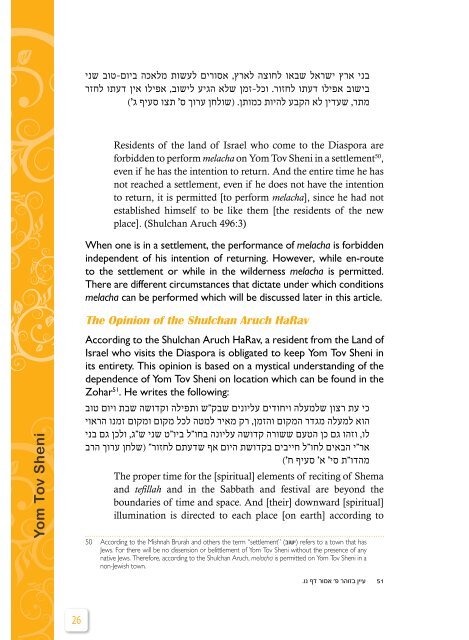Y om T o v Sheni Yom Tov Sheni - Chidushei Torah@NDS
Y om T o v Sheni Yom Tov Sheni - Chidushei Torah@NDS
Y om T o v Sheni Yom Tov Sheni - Chidushei Torah@NDS
Create successful ePaper yourself
Turn your PDF publications into a flip-book with our unique Google optimized e-Paper software.
Y<strong>om</strong> <strong>Tov</strong> <strong>Sheni</strong><br />
26<br />
ינש בוט-םויב הכאלמ תושעל םירוסא ,ץראל הצוחל ואבש לארשי ץרא ינב<br />
רזחל ותעד ןיא וליפא ,בושיל עיגה אלש ןמז-לכו .רוזחל ותעד וליפא בושיב<br />
)’ג ףיעס וצת ’ס ךורע ןחלוש( .ןתומכ תויהל עבקה אל ןידעש ,רתמ<br />
Residents of the land of Israel who c<strong>om</strong>e to the Diaspora are<br />
forbidden to perform melacha on Y<strong>om</strong> <strong>Tov</strong> <strong>Sheni</strong> in a settlement 50 ,<br />
even if he has the intention to return. And the entire time he has<br />
not reached a settlement, even if he does not have the intention<br />
to return, it is permitted [to perform melacha], since he had not<br />
established himself to be like them [the residents of the new<br />
place]. (Shulchan Aruch 496:3)<br />
When one is in a settlement, the performance of melacha is forbidden<br />
independent of his intention of returning. However, while en-route<br />
to the settlement or while in the wilderness melacha is permitted.<br />
There are different circumstances that dictate under which conditions<br />
melacha can be performed which will be discussed later in this article.<br />
The Opinion of the Shulchan Aruch HaRav<br />
According to the Shulchan Aruch HaRav, a resident fr<strong>om</strong> the Land of<br />
Israel who visits the Diaspora is obligated to keep Y<strong>om</strong> <strong>Tov</strong> <strong>Sheni</strong> in<br />
its entirety. This opinion is based on a mystical understanding of the<br />
dependence of Y<strong>om</strong> <strong>Tov</strong> <strong>Sheni</strong> on location which can be found in the<br />
Zohar51 . He writes the following:<br />
בוט םויו תבש השודקו הליפתו ש”קבש םינוילע םידוחיו הלעמלש ןוצר תע יכ<br />
יוארה ונמז םוקמו םוקמ לכל הטמל ריאמ קר ,ןמזהו םוקמה רדגמ הלעמל אוה<br />
ינב םג ןכלו ,ג”ש ינש ט”ויב ל”וחב הנוילע השודק הרושש םעטה ןכ םג והזו ,ול<br />
ברה ךורע ןחלש( ”רוזחל םתעדש ףא םויה תשודקב םיבייח ל”וחל םיאבה י”רא<br />
)’ח ףיעס ’א ’יס ת”ודהמ<br />
The proper time for the [spiritual] elements of reciting of Shema<br />
and tefillah and in the Sabbath and festival are beyond the<br />
boundaries of time and space. And [their] downward [spiritual]<br />
illumination is directed to each place [on earth] according to<br />
50 According to the Mishnah Brurah and others the term “settlement” (בושי) refers to a town that has<br />
Jews. For there will be no dissension or belittlement of Y<strong>om</strong> <strong>Tov</strong> <strong>Sheni</strong> without the presence of any<br />
native Jews. Therefore, according to the Shulchan Aruch, melacha is permitted on Y<strong>om</strong> <strong>Tov</strong> <strong>Sheni</strong> in a<br />
non-Jewish town.<br />
.ונ ףד רומא ’פ רהוזב ןייע 51


